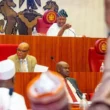The Nigerian Education Loan Fund (NELFUND) has issued a strong warning to tertiary institutions across the country, cautioning them against collecting additional payments from students whose fees have already been covered by the fund.
This alert comes amid growing concerns about schools demanding unauthorized payments from beneficiaries of the student loan scheme.
During a stakeholder meeting held in Abuja on Tuesday, the Managing Director of NELFUND, Akintunde Sawyerr, addressed heads of institutions from Colleges of Education, Agriculture, Health, and Nursing. He revealed that over 293,000 students from 303 accredited schools have already had their registration fees fully paid by NELFUND. He noted that the fund is committed to removing financial barriers for students and ensuring smooth access to education.
Sawyerr firmly stated that any school caught requesting money from students despite having received funds from NELFUND would be reported and face consequences. Although the agency does not have legal authority to dismiss or sanction school officials directly, he said they would forward such cases to the Minister of Education for administrative actions.
He said, “The commitment of NELFUND is to pay all their registration charges. Our instruction is that once they have paid their institutional charges, they must have access, I repeat, they must have access to education, lectures, classes, tutorials and examinations.”
Sawyerr added that NELFUND wants to protect students from being misled by institutions claiming they haven’t received payment when they actually have. He warned that any attempt to extort students under such false pretenses would be considered a criminal offence.
In his words, “That’s going to be a serious matter and will be attended to administratively. And if anything illegal is going on, they will be dealt with as criminal offences if schools are asking students to pay when we have already paid.”
He also clarified that students should not be asked to pay again after funds have already been disbursed. In cases where payment overlaps occurred due to the fund beginning mid-academic cycle, the situation will be managed without punishing students.
“We don’t have the power to sanction – we can’t suspend, remove or expel,” he noted, “but if we find anything, we have to take it to the minister… and escalate it to the agencies that will ensure that economic crimes and practices are not being committed.”
Sawyerr further noted that ongoing investigations are in motion to check abuses in the system. Panels from NELFUND, the National Orientation Agency, and the Ministry of Education are jointly working to ensure accountability.










